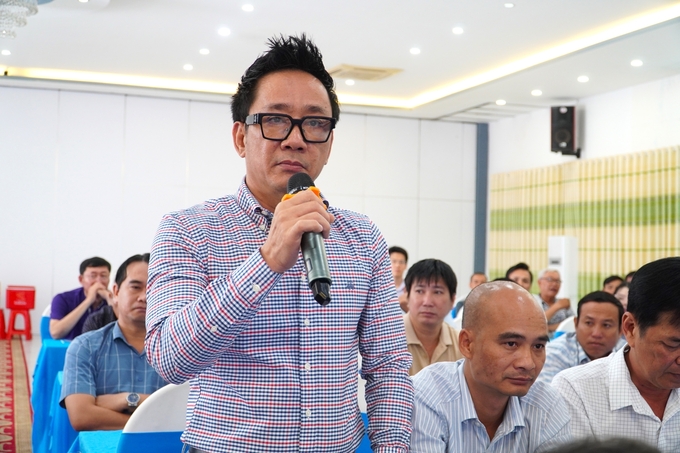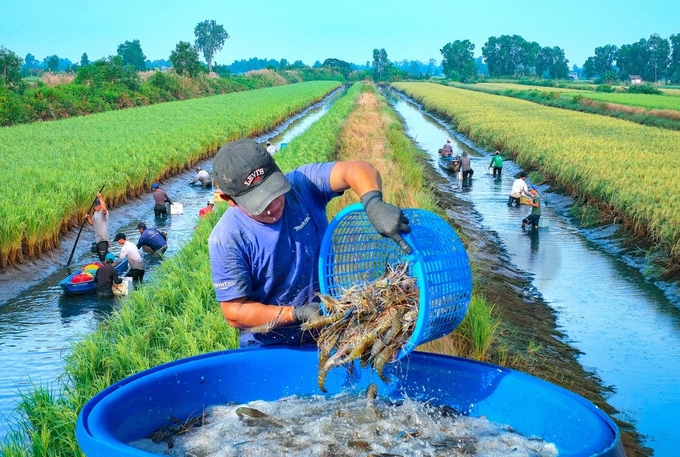June 17, 2025 | 08:39 GMT +7
June 17, 2025 | 08:39 GMT +7
Hotline: 0913.378.918
June 17, 2025 | 08:39 GMT +7
Hotline: 0913.378.918
In the context of inflation and world economic recession, accompanied by fierce competition from markets providing cheap shrimp, has made the consumption of Vietnamese shrimp difficult, with prices falling for a long time.
Talking with Mr. Ho Quoc Luc, Chairman of the Board of Directors of Sao Ta Food Joint Stock Company, about the shrimp industry development situation in 2024, Mr. Luc said there is still much work to be done.
Up to this point, the most significant difficulty in the shrimp industry value chain, as pointed out by Mr. Luc, is that Vietnam's successful farming rate is too low, according to calculations, only about 40%.
This number is only half the success rate of Ecuador. As a result, the price of Vietnamese shrimp is undoubtedly high.

Leaders of Soc Trang province visited and encouraged shrimp industry enterprises in the area. Photo: Kim Anh.
To solve this problem, Mr. Luc said it is necessary to consider the factors that influence it. First is the quality of the breed, which requires dedication and raising the sense of responsibility of the shrimp breed supply facilities and the role of quality control and circulation in the market.
Next is clean water for the farming area to minimize risks and limit diseases during shrimp farming. To do this requires the role of state management agencies.
As for farmers, farming should only be organized within the scope of financial capacity and technical knowledge.
The processing industry must also recalculate its strengths and find suitable markets, especially in reducing costs to increase competitiveness with countries worldwide.
According to Mr. Luc, finding new products to sell at good prices is a way to help businesses have financial resources to share with farmers so that the links in the shrimp industry value chain can coexist and overcome difficulties.
Regarding the shrimp industry in Soc Trang province, leaders of the province's leading shrimp enterprises commented that the competitiveness of shrimp enterprises in Soc Trang is better than the general level of the entire industry.
Recently, the Provincial Department of Agriculture and Rural Development has continuously had programs and seminars analyzing the situation of shrimp farming in the area and region to support farmers during challenging times promptly. Mr. Luc assessed this action as very timely and meaningful.
Evidence for this statement is that in 2023, the business results of Sao Ta Food Joint Stock Company, although somewhat declining, were at a low rate of about 10%. This is a source of encouragement for all officers and employees of the company to make efforts in 2024.
Proposing a strategy for the shrimp industry in Soc Trang province in the coming time, especially the 2024 farming season, which is considered difficult, Sao Ta Food Joint Stock Company is in a cautious state of mind to identify challenges and be flexible solutions.

Mr. Vo Van Phuc, General Director of Cleanfood Company, said that proving the origin of good domestic shrimp production will enhance its position and promote the development of the shrimp industry in 2024 and the following years. Photo: Kim Anh.
The farming area of Cleanfood is located in the Tran De district, Soc Trang province and the business had a very successful year of production in 2023.
The company's hundreds of hectares of the farm have built a disease control process with 2-3 layers of inspection, helping the success rate of shrimp farming in both the positive and negative seasons to be relatively high.
In particular, during epidemic or consumer crisis periods, businesses maintain a relatively stable customer base and stand firm during difficult times. Following that success, Mr. Vo Van Phuc, General Director of Cleanfood, expects to increase the quantity and scale of farming in 2024.
The plan proposed by this enterprise is to focus on investing in and expanding high-tech shrimp farming processes, focusing on biosecurity to ensure good disease management during the farming process.
The unit will choose excellent and reputable seed suppliers for shrimp seed sources. Regarding the season, Cleanfood will focus on researching and selecting a suitable time for stocking with low disease risk, specifically after the rain stops, from April to December every year.
Cleanfood proactively integrates many comprehensive solutions, including water treatment, use, and storage of water sources to ensure enough clean, virus-free water to supply farming ponds well.

The rice growing model combined with shrimp farming is in Tri Phai commune, Thoi Binh district, Ca Mau. Photo: Van Doi.
Currently, Cleanfood is developing in both production and business areas. In particular, this enterprise identifies the core business segment.
For the farming stage, Cleanfood continues to invest and improve technical factors, focusing on biosecurity solutions and disease prevention.
Facing challenges in 2024, Mr. Phuc acknowledged that the shrimp industry must reorganize production to reduce small and fragmented farming.
At the same time, it promote sharing of experiences and techniques. The critical factors that need to be considered are reducing production costs and improving product competitiveness.
To do this, businesses and farming households must focus on applying and transferring advanced technical processes, science, and technology and controlling environmental issues and diseases, increasing the success rate.
Translated by Tuan Huy

(VAN) The UNESCO Global Geopark revalidation of Non nuoc Cao Bang and the transition to a two-tier administrative model are presently undergoing a pivotal moment in Cao Bang, the northernmost province of Vietnam.
/2025/06/13/5330-2-004539_953.jpg)
(VAN) Changing policy mindset and removing investment barriers are urgent requirements to open up new development space for enterprises in the agricultural sector.

(VAN) The areas include the restoration of five million hectares of marine ecosystems.

(VAN) Dr. Le Van Nguyen, Director of the Institute of E-Commerce Management (ECM), emphasizes the potential for green development through the cultivation of fruit trees, particularly in provinces such as Son La.

(VAN) VAAS and numerous Vietnamese enterprises have signed cooperation agreements with Japanese partners to promote agricultural technology and trade connectivity.
/2025/05/29/5625-12-214801_567.jpg)
(VAN) Provincial mergers in the Mekong Delta promise to streamline administration, expand inter-provincial raw material areas, and foster close linkages in agricultural value chains, benefiting both businesses and cooperatives.

(VAN) Merging Mekong Delta provinces contributes to the expansion of agricultural raw material areas, addressing previous constraints caused by provincial boundaries. Additionally, this expansion will reduce costs and strengthen linkages between businesses, cooperatives, and farmers.